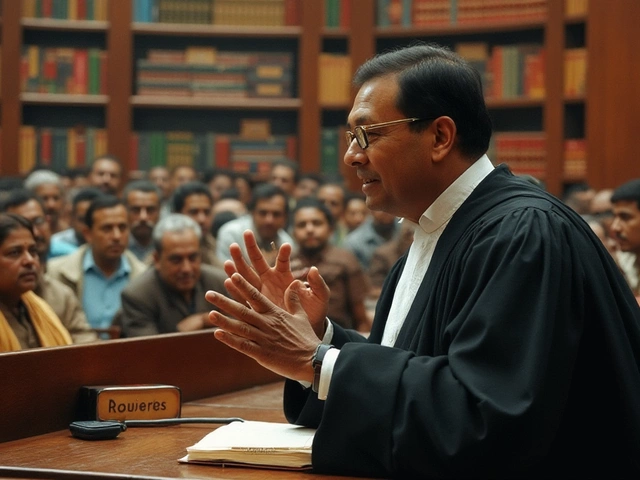India's housing scenario requires a delicate balance between tenant rights and landlord privileges. Often, conflicts arise over tenancy issues, leading to possible eviction scenarios. Understanding the legalities involved in tenant eviction is crucial for both parties, especially renters who might feel vulnerable.
In India, eviction without a court order is generally deemed unlawful. This means landlords must follow a legal path to reclaim possession, ensuring that the rights of tenants are respected and upheld under the prevailing laws. Being informed about these laws and rights can greatly empower tenants.
The procedure involves several steps, which are designed to prevent arbitrary eviction and provide a fair trial to both landlords and tenants. Knowing about these steps not only secures your living situation but also gives you the confidence to handle such situations more effectively. As we delve deeper, you'll find essential tips and insights into navigating this often tricky process.
- Legal Framework Governing Evictions
- Can a Landlord Evict Without a Court Order?
- Understanding Tenant Rights
- Steps Tenants Can Take in Case of Eviction Attempts
Legal Framework Governing Evictions
The question of whether a landlord can evict a tenant without a court order in India has been a topic of legal scrutiny, shaped significantly by the eviction laws India offers under its comprehensive legislative framework. Central to understanding this framework is the Rent Control Act, unique to each state yet similar in protecting tenant rights against unwarranted evictions. These laws establish specific conditions under which evictions may be legally pursued, ensuring that tenant and landlord are both treated fairly in the eyes of the law. They serve to prevent landlords from arbitrarily evicting tenants by establishing that a valid court order eviction must precede any attempts to remove a tenant from rented premises.
The need for such a law stems from historical imbalances in tenant-landlord relationships, where tenants were often at the weaker end. Rent Control Acts specify reasons that can justify eviction, such as non-payment of rent, owner's requirement for personal use, or violation of tenancy agreements. Yet, merely having a reason doesn't enable immediate action; landlords must file a suit in a rent control court. This court decides if the reasons are genuine and if eviction is warranted. This intricate dance between rights and responsibilities ensures that landlords cannot simply make decisions at their discretion, seeking court intervention to mediate disputes.
Moreover, the legal framework in India insists on safeguarding tenant rights through the provision of adequate notice periods. The typical notice for eviction can range from one month to six months, depending upon the state regulations. Crafting such a framework was essential to develop trust and equilibrium, as India's urban housing market continues to expand rapidly. Eviction processes aren't just bureaucratic hurdles; instead, they reflect a thoughtful balance, as noted by many legal theorists.
"The purpose of a court-backed eviction process is to ensure that the rights of every stakeholder – tenant and landlord alike – are respected and adhered to," states Dr. Meena Rana, a legal scholar specializing in property law.
Significantly, India's legal environment is evolving, with recent amendments aiming to streamline rental agreements and litigations to reduce the burden on courts. For instance, the Model Tenancy Act 2019 (not yet implemented everywhere), proposed to address check real estate inventory loss due to legal hassles. This act suggests creating a separate court system exclusively for resolving property disputes, thus quickening the process of court order evictions. It's worth noting that though the spirit of these laws is consistent across the Indian states, each state's interpretation and application can vary, highlighting the federal nature of India's legislative landscape.
Understanding this legal framework is crucial not only for tenants but also for landlords, as it delineates the boundaries within which they must operate. For tenants, knowledge of such laws provides security and a sense of assurance, ensuring they are not unjustly subject to eviction without the nuanced process prescribed by law. The intricate balance of tenancy laws in India showcases a mature system that's responsive to the needs of its citizens. Whether you're a tenant or a landlord, knowing where you stand legally can make a significant difference in safeguarding your interests.

Can a Landlord Evict Without a Court Order?
In India, the legal landscape surrounding eviction laws is structured to safeguard tenants from unjust removal. It's crucial to recognize that a landlord cannot legally evict a tenant without a formal court order. This rule serves as a bulwark against arbitrary actions by landlords, ensuring that tenants have a chance to contest an eviction attempt through proper legal channels. The right to stay in a rented premises is protected unless a civil court decides otherwise after thorough proceedings.
The necessity for a court order arises from the comprehensive nature of tenancy agreements and the protective laws enacted under acts like the Rent Control Act. These laws stipulate the conditions under which a landlord may seek eviction, typically including contractual violations like non-payment of rent, subletting without permission, or damage to the property. However, even in these circumstances, landlords must approach the courts to legitimize their claims.
“Decisions shouldn't be made in anger or frustration,” says Siddharth Dhanvant Shanghvi, explaining the procedural necessity of court intervention. Such legal requirements ensure a balanced examination of the context and evidence.
Court intervention involves filing an eviction suit, where the landlord is required to prove valid grounds for eviction as per the tenancy laws applicable. The role of the judiciary is to assess the situation objectively and determine if eviction is warranted. This judicial scrutiny ensures fairness, given the socio-economic importance of housing stability. During such proceedings, tenants have the opportunity to present their side, contesting any claims that may be unsubstantiated or unfair. It's also important to note that eviction without following the proper legalities can result in penalties for landlords, reinforcing the system's emphasis on legal and procedural integrity.
For tenants facing eviction threats, understanding their rights is vital. They should seek legal advice to defend against unauthorized eviction attempts. If a landlord threatens or attempts to forcibly evict a tenant without a court mandate, tenants have the legal right to file a police report, as this constitutes harassment. Besides legal action, being informed about documentation like the original lease agreement and tenancy act specifics can fortify a tenant's stance. Informally, building amicable relations with landlords and ensuring clear communication can help in preventing misunderstandings that might lead to unnecessary eviction threats.

Understanding Tenant Rights
The relationship between landlords and tenants in India is governed by a multitude of laws which are designed to ensure fair play and balance the scales. As a tenant in India, understanding your rights is paramount, not just for your security but also to promote a harmonious coexistence. Tenancy laws often vary from state to state, governed by a mixture of central and state-specific legislature. The most prominent act is the Rent Control Act, which aims to restrict unreasonable increases in rent and protect tenants against unjust eviction.
Under these laws, tenants have the right to a safe and habitable living environment. This includes regular maintenance of the property and essential services like water and electricity. If a landlord neglects these duties, tenants are allowed to file complaints with local housing authorities. A crucial aspect of tenant rights is protection against arbitrary eviction; landlords are required to give proper notice, which should comply with the legal standards of the particular state. Eviction without meeting these requirements is considered illegal.
Legal Safeguards
An essential protection for tenants comes from the legal requirement that for most circumstances, eviction can be pursued only through a court order. This ensures that every eviction is subject to legal scrutiny, aiming to protect tenants from being unlawfully forced out. In urban areas, tenants are also protected under provisions that prevent increases in rent beyond a certain limit, unless pre-agreed, mitigating runaway living costs.
“Tenants in India are guarded by robust yet complex legal provisions, which aim to create a balanced housing ecosystem.” – National Housing Federation
This is crucial knowledge for tenants to possess, as it ensures they are not subjected to undue financial pressures. Legal frameworks like these aim to strengthen the bargaining power of tenants, providing them with necessary support and the means to secure legal redress if needed.
Actions Tenants Can Take
In cases where a tenant feels their rights are being violated, there are several steps that can be taken. First, attempt mediation with the landlord to resolve any disputes amicably. If this proves fruitless, tenants should not hesitate to approach tenant unions or legal professionals for advice. It's also beneficial to document all communications about grievances, as this evidence can be invaluable if legal proceedings commence. Be proactive about understanding the specifics of your agreement; seek timely clarification on areas you are unsure about. Being informed is your greatest ally in ensuring these tenant rights are upheld, which in turn can vastly improve your security within your rented premise.

Steps Tenants Can Take in Case of Eviction Attempts
Tenancy in India can sometimes lead to disputes, especially when a landlord wishes to reclaim the property. Knowing what steps to take during eviction attempts is a vital defense mechanism for tenants. The first and foremost step is to remain calm and composed. Often, landlords resort to intimidation to push tenants into leaving willingly. A calm tenant is not an easy target for such tactics, and this composure can also be beneficial during legal proceedings if they become necessary.
It is critical for tenants to collect and organize all pertinent documents related to the rental agreement. This includes copies of the lease, proof of rent payments, and any other correspondence with the landlord. These documents serve as evidence of the tenancy terms and can help in establishing the tenant's case. The law generally protects tenants who have fulfilled their obligations, and having documentary proof can prevent wrongful eviction.
The next step involves communication. Reaching out to the landlord for a dialogue can sometimes resolve issues without escalating them legally. Often, misunderstandings or unmet expectations lead to tension. By initiating a polite and firm conversation, tenants can clarify misconceptions and even negotiate terms more beneficial for both parties. If direct communication fails, seeking mediation can be a viable option. Many cities have tenant protection societies or legal aid services that can help mediate disputes without court involvement.
Should the situation demand legal action, tenants should not hesitate to consult a lawyer who specializes in tenant rights. This professional guidance is indispensable in understanding the nuances of the law, especially with acts like the Rent Control Act that oversee most rental agreements in urban areas. Legal counsel can help draft responses to any notices and ensure that all legal protocols are followed correctly, thus safeguarding the tenant's rights.
Knowing one's rights under the Rent Control Act is also crucial. This legislation dictates the conditions under which a landlord can legally initiate eviction. Grounds for lawful eviction typically include non-payment of rent, subletting without permission, or causing damage to the property. Understanding these stipulations can help tenants judge the legality of their landlord's claims. Empowerment comes from knowledge, and a tenant who knows the law stands stronger against unfair attempts.
In an era where information is at everyone's fingertips, educating oneself about tenant rights in India is more straightforward than ever. Various online platforms and forums provide resources and support, enabling tenants to connect with others facing similar issues and learn from their experiences. These platforms can sometimes provide quick answers to pressing legal questions, ensuring that tenants are not blindsided by unexpected eviction efforts.
Apart from individual efforts, sometimes collective action can yield better results. If multiple tenants in a building are facing similar eviction pressures, collaborating with them can amplify their voices. Forming a tenants' association can provide more substantial leverage against unfair practices and often attracts media attention, putting additional pressure on landlords to act fairly.
"The worst thing for tenants is ignorance," says John Doe, a noted legal expert on housing laws. "Being unaware of one's rights is what leads to many losing homes unjustly."
Ultimately, tenants must act promptly when facing any eviction threat. Procrastination can compromise their standing in any legal proceedings that might follow. By staying informed and proactive, tenants can navigate these challenging waters with confidence and ensure their living arrangements are secured legally.


